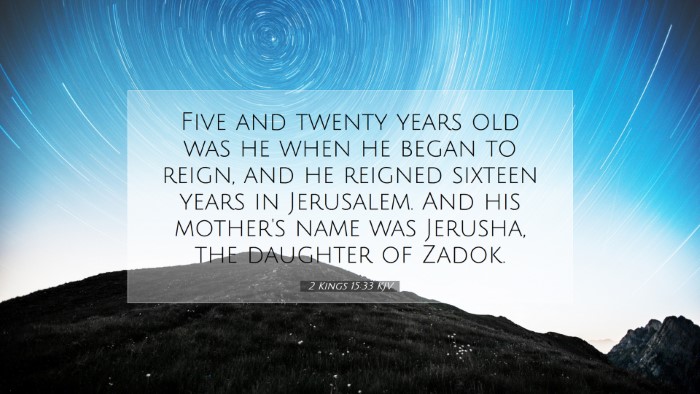Commentary on 2 Kings 15:33
Verse: “He was twenty-five years old when he began to reign, and he reigned sixteen years in Jerusalem. And his mother’s name was Abi, the daughter of Zechariah.”
Introduction
2 Kings 15:33 provides an introduction to the reign of Jotham, son of Uzziah (Azariah), who ruled over Judah. This brief verse encapsulates important details including his age when he ascended to the throne and the duration of his reign. Such detail allows us to explore the significance of leadership in Judah during this period and the theological implications of royal authority.
Contextual Background
The context of Jotham's reign is pivotal. Jotham comes to power during a tumultuous time in the history of Judah and Israel. His father, Uzziah, reigned for a notable period, yet his later years were marred by pride leading to his judgment. Jotham inherits both the legacy of his father's accomplishments and the challenges posed by his mistakes.
This verse fittingly follows a pattern seen throughout the historical books of the Bible, where lineage, age, and the tenure of kings are presented. It reminds the reader that leadership is both a privilege and a responsibility marked by accountability before God.
Commentary Insights
Matthew Henry's Commentary:
- Jotham is marked by a simplified but significant introduction as he is just 25 at the commencement of his reign. This reveals the narrative's focus on his qualifications and the impending moral failures of the nation as a whole.
- Henry emphasizes that Jotham's reign was uneventful in terms of major military campaigns or monumental acts, but he serves as a stabilizing figure amid the chaos created by preceding rulers.
- His mother, Abi, is introduced here, representing the importance of maternal influence in the spiritual and moral directions of a leader. Mothers play a significant role in shaping their children's future, particularly in the unfolding destinies of the kings of Israel and Judah.
Albert Barnes' Notes:
- Barnes points to the significance of the individual named Abi, linking this to the broader theme of dynastic succession and the intertwining of familial ties within Israel's royal families. This passage, though concise, connects the reader to the larger historical context.
- He notes that the age of ascension to kingship at 25 can indicate reckoning minds that are still forming; thus, the importance of surrounding oneself with wise counsel and godly advisors cannot be overemphasized.
- Barnes also indicates that the figure of Jotham serves as a moral contrast to the kings that followed him. His character is framed by his faithfulness to God despite the nation’s spiritual decline, which sets the stage for future insights into the challenges faced by subsequent leaders.
Adam Clarke's Commentary:
- Clarke intricately analyzes Jotham’s reign in light of historical accounts, noting that the era was marred with idolatry and national strife. His perspective provides a wider theological frame regarding the effects of leadership on the populace's spiritual health.
- Clarke also speaks on the implications of a 16-year rule; a duration that allows for both stability and the potential for moral failing, providing a necessary warning to current leaders in both ecclesiastical and governmental realms.
- The historical significance of Jotham is that, while he did not remove the high places where people worshipped idols, he took measures to bolster national defenses, which indicates a complex interplay of faith and pragmatic leadership.
Theological Reflections
This verse invites deeper theological reflection on leadership within a covenantal relationship with God. The emphasis on age, maternal lineage, and reign provides contemporary leaders with a framework for understanding the sacred nature of governance, particularly in community and ecclesial settings.
Leadership is portrayed not as a mere position, but a role filled with divine responsibility. As Jotham navigated his reign, the challenge of spiritual fidelity loomed large. Modern-day theological applications encourage leaders to foster a relationship with God that informs their governance and decision-making processes.
Moreover, the mention of mothers in the biblical narrative is a reminder of the generational impact of familial faith. This highlights the importance of spiritual heritage and the critical role parents play in instilling values within their children that govern not only personal conduct but also public service.
Leadership Lessons from Jotham
- The Importance of Age and Maturity: While 25 is a relatively young age for kingship, it signifies the necessity for wisdom and maturity, often acquired through counsel and experience. Leaders must seek mentorship and guidance regardless of their position.
- Balancing Faith and Governance: Jotham remained faithful to God amidst a declining spiritual culture. Modern leaders, religious or secular, are called to navigate their duties with moral integrity and uphold biblical values in a challenging cultural landscape.
- Influence of Family: The legacy one inherits and the environment in which one is raised profoundly shapes leadership styles and decisions. Emphasizing the biblical call of discipleship within families can help foster future generations of leaders.
- Response to National Crisis: Jotham’s reign amid regional challenges reflects the realities leaders face today. The call for proactive measures and trust in God during uncertainty is ever relevant.
Conclusion
2 Kings 15:33 serves not only as a simple historical record but embodies a multitude of reflections relevant to present-day leaders, theologians, and scholars. The life and reign of Jotham beckon deeper understanding of the principles of righteousness, the weight of leadership, and the enduring influence of faithful parenting. As we parse through these rich narratives, may we seek to uphold the foundational truths that shape godly governance and foster a culture rooted in divine principles.


